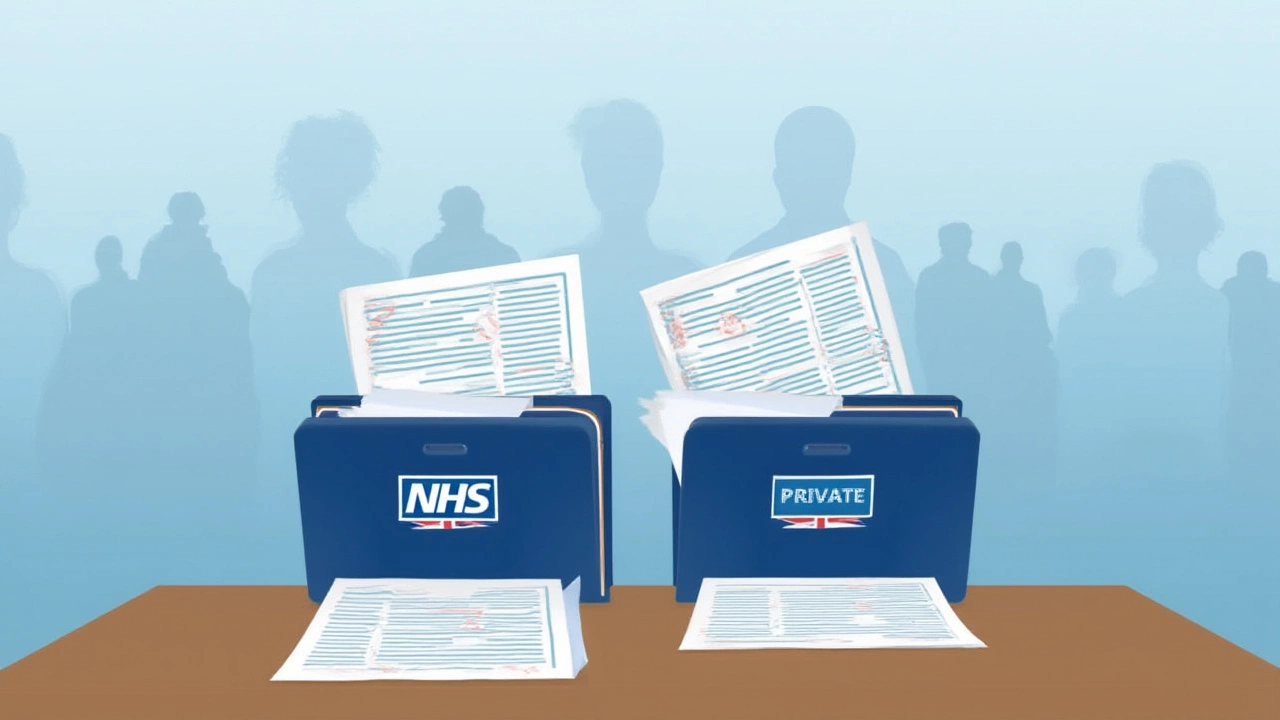
Someone recently spent £250 on a private consultation and walked out clutching a diagnosis letter—maybe hopeful, maybe frustrated, but always wondering: ‘Will the NHS accept private diagnosis, or will I have to start from scratch?’ Private assessments can feel like a shortcut but navigating the NHS maze after going private isn’t always so simple. There are a lot of myths and mixed stories swirling online. So, where do you really stand? Let’s clear it up, step by step, without the runaround.
Understanding How the NHS Handles Private Diagnoses
First off, the NHS doesn’t live in a bubble cut off from private healthcare—it’s a common misconception that if you go private once, you’re “on your own” forever. The actual policy is a lot more nuanced. If you get a diagnosis from a private specialist (think psychiatry, orthopaedics, skin, or even rare conditions), the NHS can consider this diagnosis—but there’s no absolute legal right to automatic transfer or acceptance. Instead, it hinges on your GP and NHS consultant’s individual judgement.
Your NHS GP acts as the “gatekeeper”—even after a private appointment. According to the official NHS guidance updated in early 2024, private test results or diagnostic letters must be reviewed and approved by your NHS doctor before any NHS treatment or referrals can begin. This isn’t just red tape; it shields patients from potentially unreliable or incomplete private assessments and ensures a consistent standard of care.
A recent NHS Digital report revealed that in England, around 63% of NHS GPs routinely reviewed private diagnoses. Most approved them for ongoing NHS care, but roughly one in five asked for additional NHS assessments, especially in complicated or poorly-evidenced cases.
| Year | Private Diagnoses Accepted by NHS (%) | Further NHS Assessment Needed (%) |
|---|---|---|
| 2023 | 66 | 18 |
| 2024 | 63 | 21 |
This means most private diagnoses do pave the way for NHS referrals and treatment. However, the NHS won’t always accept them “as is”—sometimes your GP will need to verify the findings before moving forward, especially if the private clinic used non-standard tests or treatments unavailable on the NHS.
What Happens After a Private Diagnosis: The Referral Process
So, what’s your likely journey once you’ve paid out of pocket for that private consult? It all starts by taking your private diagnosis letter to your GP. It’s crucial to be upfront with your GP about what was done privately: the specialist seen, the tests taken, and the reasons for seeking private care. Most NHS GPs appreciate honesty—the last thing they want is fragmented care.
Your GP will usually do one or more of the following:
- Review the diagnosis (and any attached test results) for clarity and accuracy.
- Assess whether the findings fit NHS treatment pathways and guidelines.
- Discuss options for further assessment or treatment within the NHS.
- Refer you directly to an NHS specialist (if your case matches NHS criteria).
- Occasionally, order additional investigations if the private clinic’s workup missed relevant steps or used tests the NHS doesn’t recognise.
One key tip: always ask your private specialist for copies of all test results, not just a summary diagnosis. NHS guidelines published in December 2024 specifically advise patients to provide “full clinical and laboratory documentation” from private clinics, so your GP isn’t left chasing missing results. Many delays in NHS acceptance stem from incomplete paperwork—something easy to avoid with the right prep.
It’s also worth knowing that the NHS isn’t obligated to supply drugs, therapies, or procedures approved by private clinics if those treatments aren’t commissioned or available on the NHS. A classic example: some costly treatments for rarer cancers or neurological disorders, which might be approved privately, but don’t get NHS funding. In these cases, your GP or NHS specialist will explain your options and, if needed, guide you through an Individual Funding Request (IFR)—a more complex, case-by-case review process.
But for most routine diagnoses—ADHD, autism assessments, joint problems, common autoimmune diseases—the NHS is pretty used to translating private reports into care plans. So you won’t need to redo every scan or test, especially if the private doctor followed national protocols.

Tips and Pitfalls: Making Your Private Diagnosis Work within the NHS
Here’s where things get practical. There’s no single set way every NHS practice deals with external reports. Some GPs act as fierce patient advocates, quickly moving things along. Others stick strictly to the guidelines, and may seem slow or sceptical about “outside” results. So what helps tip the odds in your favour?
- Get everything in writing: Don’t settle for a phone summary—ask for a full, signed letter, preferably with lab or imaging attachments.
- Choose mainstream clinics: If possible, go to private clinics whose specialists also work in the NHS. Their diagnostic standards align better, which helps convince future NHS colleagues.
- Understand NHS criteria: Check whether your diagnosis triggers automatic NHS treatments, or if extra “boxes” need ticking. For example, the NICE guidelines for ADHD meds require detailed psychological and educational history, not just symptom checklists—if your private assessment skips these, your GP may need more.
- Be polite, but persistent: If you feel your private diagnosis isn’t being considered fairly, ask for a second opinion. NHS GPs are not required to accept any external letter without reviewing it, but you are entitled to your own clinical pathway review.
- Check your local NHS trust's protocol: Guidance varies between areas. Some trusts have fast-track policies for private psychiatric assessments; others require all cases to be re-evaluated.
Watch out for these common pitfalls:
- Missing or poorly documented diagnoses—make sure your private doctor spells out exactly what they found, how, and why.
- Private tests not recognized by NHS labs—DNA testing and some advanced imaging (like 7T MRIs) are great, but your GP might see them as unvalidated.
- Treatments not offered by the NHS—if your private consultant suggests a drug or intervention not funded by your local NHS, it’s not a simple handoff. You may face appeals or have to self-fund ongoing therapies.
Another inside tip: some patients have found it easier when their private consultant sends the diagnosis directly to the NHS GP, not just the patient. A direct doctor-to-doctor letter carries more weight and saves you time in chasing signatures or clarifications.
The system isn’t perfect, and it can feel unfair. But pushing for clear, complete information puts you in a stronger place to advocate for yourself. You don’t have to accept confusion or brush-offs—your needs matter, and you’re allowed to question, clarify, and ask for help every step of the way.
Real World Scenarios: Success Stories and Stumbling Blocks
If you ask around, you’ll get stories that run the spectrum—from “I got my referral straightaway” to “I was told to join the NHS waiting list again, diagnosis ignored.” Here are a few snapshots that illustrate how it plays out in practice, across England, Scotland, and Wales.
Take the case of Sasha in Kent. After waiting 18 months for an NHS autism assessment, her family paid £1,600 for a widely respected private psychologist who also consulted for the NHS. Report in hand, Sasha’s GP reviewed the findings and transferred her directly to local NHS autism support services—no repeat assessment needed. Here, clear documentation and matching NHS/ private standards made the handoff seamless.
Contrast that with Will in Manchester, who went private for a controversial ‘food intolerance’ test not recognized by the NHS. His GP read the results but explained that they didn’t fit UK medical guidelines—so no further NHS action was available on that basis. Instead, the GP offered an NHS-endorsed dietician referral for evidence-backed allergy testing.
Then there’s the grey area: Priya in Glasgow got a private MRI scan on her knee after a sports injury. The scan showed a minor ligament tear, but when she brought the DVD to her NHS GP, it turned out the local hospital’s radiology software couldn’t read the file. She had to get the private clinic to send a DICOM-compatible disc, which delayed her NHS physio referral. It’s a reminder that even good data can get lost if the formats don’t match up.
Nationally, the NHS Standard Contract (updated April 2024) makes clear that private and NHS “care must be kept as separate packages.” But—if your private doctor’s diagnosis fits the NHS’s criteria and includes proper supporting evidence, most GPs will try to accept it where possible and safe. Just don’t expect full NHS funding for expensive new drugs your consultant endorsed outside usual funding routes.
On the bright side, waiting times can drop dramatically when you’ve already done the heavy lifting. For example, a 2025 digital health survey found that patients who handed in complete private psychiatric assessments were able to start NHS medication up to 12 months faster than if they’d waited for the initial assessment on the NHS alone. That time saving, though, hinges on everything being clearly documented.

Frequently Asked Questions and Final Tips
People always want concrete answers: ‘Will the NHS take my private diagnosis or not?’ The only honest answer is: it depends, but most of the time, yes—especially for mainstream conditions using standard testing. However, you might face extra checks or repeat assessments if the findings aren’t clear, the tests aren’t recognized, or the treatment doesn’t fit NHS pathways.
Here’s a quick run-through of questions that crop up most:
- Can I move from a private to NHS consultant after diagnosis? Yes, but you need your GP to refer you into the NHS system; you can’t just “transfer files” and jump queues.
- Will the NHS pay for my private treatment? No—the NHS can’t reimburse your private spend. But if further treatment is approved under NHS care, you won’t need to pay again.
- What if my GP refuses to accept my private diagnosis? You can ask for the exact reason, request a second opinion, or file a formal complaint (called a Practice Complaint).
- Is NHS waiting time shorter for those with private diagnosis? Sometimes, since diagnostic delays are often the slowest part of the process. But for surgeries, or specialist treatments, you’ll still join the main NHS queue for what follows.
- Can I keep seeing private and NHS doctors at the same time? Yes—you’re allowed to “mix and match” care. The key rule: don’t have both types of treatment for the same issue simultaneously; keep each package of care separate, as per the NHS Standard Contract.
One last tip: always keep your private diagnosis documentation organised and up to date. Bringing in a clear folder—or even sending a secure email to your GP ahead of a visit—shows you’re on top of your case. If the paperwork is complete, with proper stamps or signatures, your chance of a smooth handover rises sharply.
The bottom line? The *NHS* will usually accept private diagnoses, but only within set boundaries, and not without the say-so of your GP. Push for full documentation, and don’t be afraid to ask for clarity if you feel your private efforts are being ignored or misunderstood. It’s your health, your story, and you’re absolutely allowed to get the best from both worlds if you know the ropes and insist on being heard.